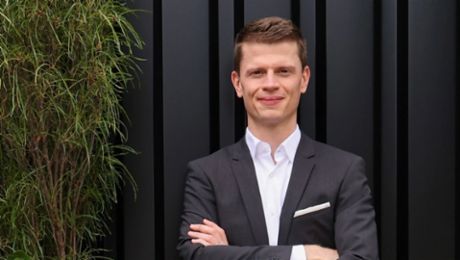Janina, what does the topic of sustainability mean to you?
Janina Pfleiderer-Stellbogen: Sustainability has been a part of my life since I was young, as it plays an important role in my family. I was made aware early on that the resources of our planet are finite and that we need to find solutions that protect our environment. These experiences sparked in me the desire to advocate for a more sustainable future, not only in my personal life but also professionally – in my role in the sales strategy area, I can contribute to this effort.
What contribution to sustainability at Porsche can you make in your daily work?
Pfleiderer-Stellbogen: Together with my colleague Tobias Cavaleri, I work directly at the interface of the sustainability strategy and sales. In this role, I initiate specific projects in international markets as well as the sales department and support their implementation. This includes actively managing relevant initiatives and subsequently ensuring transparent and target-group-oriented communication. We convey these initiatives through the sales subsidiaries to the market and to our customers. Another focus of my work in the area of sustainability is the internal knowledge transfer to our employees in the sales department and the global sales organization. We utilize various exchange formats and training sessions, including internal company theme weeks on sustainability and specific workshops with different departments.
What significance does sustainability have for Porsche's customers? What is particularly important to them?
Pfleiderer-Stellbogen: With the purchase of one of our vehicles, many of our customers fulfill a lifelong dream – also because Porsche is an exclusive and unique brand with which they can identify. A positive brand image is essential for this. Our customers value that Porsche conveys values, takes responsibility, and acts with a forward-looking approach. When it comes to sustainability, the expectations of our target groups are very diverse. Our latest market research has shown that customers primarily associate sustainability with the ecological product-related aspects. This is particularly important for attracting new target groups for fully electric vehicles, where reduced greenhouse gas emissions play a significant role. At the same time, we observe that social issues are gaining increasing importance. Therefore, we want to support individual markets in implementing social projects with local benefits, especially in the areas of education, inclusion, and basic services.
What regional differences exist in customer perceptions of sustainability? How are these being addressed?
Pfleiderer-Stellbogen: The exchange with local sales colleagues and extensive market research have shown us that there is particularly high expectation in Europe regarding environmental, social, and governance issues. In China, on the other hand, sustainability is primarily associated with electrification and technological advancement. We also recognize regional differences within a country regarding the importance of sustainability, for example, in the United States: In regions with a higher environmental awareness, potential customers tend to value more sustainable products, while in other parts of the USA, there is a noticeable reluctance or even skepticism towards certain issues. We incorporate these different perspectives and expectations at Porsche and derive appropriate measures from them. We strive to consider these global differences in our sales communication by specifically adapting it to regional needs while maintaining a consistent global brand identity. Despite the differences, we observe a growing expectation worldwide: Companies like Porsche are increasingly expected to contribute to more sustainability.
How do you and your team derive concrete projects from these insights in collaboration with Porsche's sales regions?
Pfleiderer-Stellbogen: Together, we collaborate with colleagues from our five sales regions: Germany, Europe, North America, China, and the so-called overseas and growth markets. At Porsche, we divide these regions into a total of 20 markets and regional offices. On one hand, we maintain close contact to set targeted impulses and initiate new projects. On the other hand, there are global exchange formats that provide the sales regions with the opportunity to share experiences and learn from one another. In this process, the markets contribute their own ideas, from which we jointly develop projects and support their implementation. Our overarching goal is to make local business processes more sustainable and to contribute to the local environment and community. To measure the effectiveness of these projects, we use an internal evaluation system that encompasses over 30 key performance indicators. This allows us to capture relevant activities related to ecological, economic, and social issues – from decarbonization goals to environmental management systems and local partnerships. In this way, we can work together with colleagues from the sales regions and markets to define specific improvement potentials and objectives, as well as derive best practices.
Are there any international sustainability initiatives that particularly inspire you?
Pfleiderer-Stellbogen: Every year, we recognize outstanding projects. I would like to highlight three of these projects in particular: With a program aimed at reducing environmental impacts, Porsche China was able to decrease its CO₂ emissions by approximately 5,000 tons in 2024. Local measures included the use of solar panels, energy-saving LED lighting, and eco-friendly packaging. In Guatemala, Porsche employees collaborated with the local organization TECHO on a housing initiative. As part of this commitment, seven homeless families received new homes with access to drinking water. The winner of our award in 2024, Porsche Middle East, launched a project that donated nearly 2,000 handcrafted solar lamps to people with limited access to electricity. It deeply moved me to see how children living in darkness, along with their families in India, can now read and learn in the evenings.
Looking back at Porsche's products: How do you approach convincing customers of the sustainability of battery-powered vehicles?
Pfleiderer-Stellbogen: We aim to leverage our insights into customer needs and specifically address common questions and potential concerns – such as regarding the CO₂ balance, the sourcing and extraction of battery raw materials, or battery recycling. On one hand, we equip our dealers with information to comprehensively and transparently inform our customers. At the same time, we strive to communicate information in the opposite direction by incorporating relevant customer concerns into core vehicle projects – ideally all the way to their concrete piloting or implementation. Additionally, we focus on transparent communication. An example of this is the product page for our new fully electric Macan, where we present sustainability aspects along the entire value chain.
A look into the future: Where do you see trends? What are your wishes?
Pfleiderer-Stellbogen: Currently, one might initially get the impression that sustainability is losing significance in some public discussions. However, I am convinced that the relevance of these topics will continue to grow for us and our customers. In this context, I hope that sustainability will be considered more holistically in the public sphere in the future – not only focusing on ecological aspects but also addressing social and economic issues. For Porsche, it will be important to continue advancing these topics and to expand our sustainability activities in international markets. I see myself as a voice for our customers, intentionally incorporating their perspectives into the company's sustainability projects – thus contributing to a responsible future.
Info
In the interview series "Perspectives on Sustainability", Porsche employees talk about their specialist subject areas. The interview with Janina Pfleiderer-Stellbogen is part 16 of the series.


